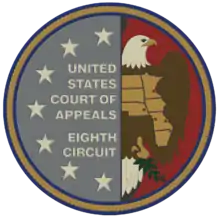Jenson v. Eveleth Taconite Co.
Jenson v. Eveleth Taconite Co., 130 F.3d 1287 (8th Cir. 1997),[1] was the first class-action sexual harassment lawsuit in the United States. It was filed in 1988 on behalf of Lois Jenson and other female workers at the EVTAC mine in Eveleth, Minnesota on the state's northern Mesabi Range, which is part of the Iron Range.
| Jenson v. Eveleth Taconite Co. | |
|---|---|
 | |
| Court | United States Court of Appeals for the Eighth Circuit |
| Full case name | Lois E. Jenson v. Eveleth Taconite Company, et al. |
| Submitted | October 21, 1997 |
| Decided | December 5, 1997 |
| Citation(s) | 130 F.3d 1287; 75 Fair Empl. Prac. Cas. (BNA) 852,72 Empl. Prac. Dec. (CCH) ¶ 45,174; 48 Fed. R. Evid. Ser v. 454 |
| Case history | |
| Prior action(s) | 139 F.R.D. 657 (D. Minn. 1991); 824 F. Supp. 847 (D. Minn. 1993) |
| Subsequent action(s) | Rehearing en banc denied, February 18, 1998 |
| Court membership | |
| Judge(s) sitting | Theodore McMillian, Floyd Robert Gibson, Donald P. Lay |
| Case opinions | |
| Majority | Lay, joined by a unanimous panel |
Facts
Jenson first began working at the site in March 1975 and along with other women, endured a continuous stream of hostile behavior from male employees, including sexual harassment, abusive language, threats, stalking and intimidation. On October 5, 1984, she mailed a complaint to the Minnesota Department of Human Rights outlining the problems she experienced.[2] In retaliation, her car tires were slashed a week later. In January 1987, the state's agency requested that Ogelbay Norton Co.,[3] a Cleveland, Ohio-based part-owner of the mine, pay US$6,000 in punitive damages and $5,000 to Jenson for mental anguish, but the company refused.
On August 15, 1988, attorney Paul Sprenger filed Lois E. Jenson and Patricia S. Kosmach v. Eveleth Taconite Co. in the U.S. District Court in Minneapolis. Class-action status was requested at the time, and granted by James M. Rosenbaum on December 16, 1991. Jenson quit working at the mine on January 25, 1992, and was diagnosed with post-traumatic stress disorder a short time later.
A liability trial began on December 17, 1992, in front of Judge Richard Kyle in St. Paul, Minnesota, and six months later, he ruled that the company should have prevented the misconduct.[4] The company was ordered to educate all employees about sexual harassment.
Patrick McNulty of Duluth was named special master a few months later to oversee a trial that would determine the amount of money owed to the women in damages. The retired federal magistrate permitted lawyers from the mine company to obtain medical records of all of the women for their entire lifetimes. Ahead of the trial, the plaintiffs endured long depositions that explored their personal lives in great detail.
The first half of the trial for damages began in Duluth on January 17, 1995 and lasted until February 10. After a break, it resumed on May 22 and ended on June 13.
On March 28, 1996, McNulty released a 416-page report that called the women "histrionic," made public details about their private lives, and awarded them an average of $10,000 each. However, the judgment was appealed and reversed by the Eighth Circuit Court of Appeals on December 5, 1997.[1] A new jury trial on damages was ordered.
Settlement
On December 23, 1998, just before the trial was set to begin, fifteen women settled with Eveleth Mines for a total of $3.5 million. One of the original plaintiffs, Pat Kosmach, died partway through the case, on November 7, 1994.
The case was documented in the 2002 book Class Action and a 2005 fictionalized film version, North Country.
See also
- Hostile Advances: The Kerry Ellison Story movie about Ellison v. Brady which set the "reasonable woman" precedent in sexual harassment law
- Hostile work environment
- List of class action lawsuits
- Meritor Savings Bank v. Vinson
- Oncale v. Sundowner Offshore Services
- Oglebay Norton Corporation
References
- Jenson v. Eveleth Taconite Co., 130 F.3d 1287 (8th Cir. 1997).
- Minnesota Department of Human Rights
- Oglebay Norton Archived June 19, 2006, at the Wayback Machine
- Jenson v. Eveleth Taconite Co., 824 F. Supp. 847 (D. Minn. 1993).
Notes
- U.S. 8th Circuit Court of Appeals case documents
- Class Action: The Story of Lois Jenson and the Landmark Case That Changed Sexual Harassment Law (2003) ISBN 0-385-49613-3
- North Country at IMDb
External links
- Text of Jenson v. Eveleth Taconite Co., 130 F.3d 1287 (8th Cir. 1997) is available from: CourtListener Google Scholar Justia
- Class Action: What Happens When Employers Refuse To Remedy Sexual Harassment, plus interviews